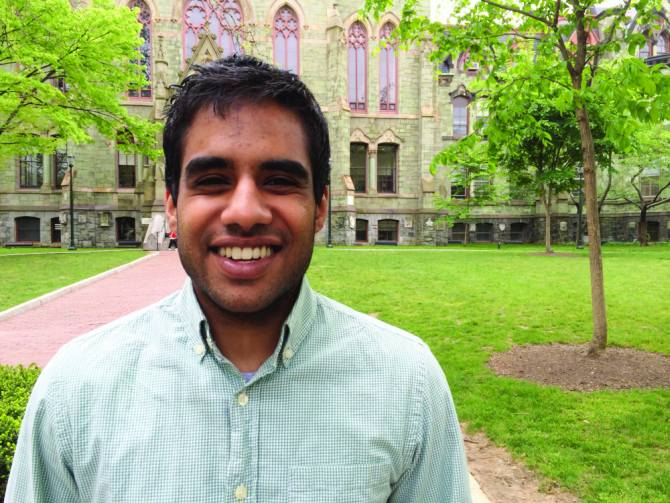Arthur J Pais
Meet Vignesh Selvakumaran, a bioengineering grad from the University of Pennsylvania who wants to be a doctor and believes that while medicine cannot heal every problem, listening to a patient’s wishes and being compassionate can be just as effective.
Several times a month in the past year, Vignesh Selvakumaran would volunteer at the Children’s Hospital of Philadelphia -- to comfort and counsel small children about there loved one’s illness and explaining why their sibling is sick and needed their parents' attention.
Selvakumaran, the first recipient of Sobti Fellowship who will be spending nine months at an eye clinic in Madurai, recently graduated from the University of Pennsylvania with a degree in bioengineering.
'A fundamental part of doctoring is physician-doctor communication,' he wrote in the essay for Sobti Fellowship, which was established through a gift from UPenn alumnus Rajiv Sobti and Slomi Sobti to provide funding for a recent graduate to conduct independent research in India and administered through the Centre for the Advanced Study of India at UPenn.
'Being able to communicate with anyone independent of age, race, or gender is an important part of establishing successful relationships and providing the best care. I see my work with CHOP as an invaluable opportunity to build my interpersonal skills.'
 |
Selvakumaran wrote about a 6-year-old girl called Lily, whose sister Alice was born premature and was on extracorporeal membrane oxygenation. Talking to Lily about why her sister 'looked like a robot' was difficult because she barely spoke any English and was always unhappy about her parent's negligence of her.
Selvakumaran would play with Lily -- everything from Barbie make-up to building monsters with Knex toys. Eventually, he was able to talk to Lily about Alice's condition, and during the holiday season Lily and he created a picture frame for her sister.
'Lily and Alice taught me that while medicine cannot heal every problem, listening to a patient's wishes and being compassionate can be just as effective,' Selvakumar wrote.
Since freshman year, Selvakumar has been visiting underserved schools in West and Central Philadelphia through the Weiss Technology House.
"Education has allowed my family to escape poverty by providing opportunity," Selvakumar told India Abroad, "and it shall always be a foundation to the way I hope to doctor."
Similar empathy, curiosity and the hunger to learn will help him learn many things at Aravind Eye Care System in Madurai, he said. His project aims to create a new low-cost medical device for cataract surgery.
He has been at the forefront of several research projects at UPenn. As part of a senior design requirement, Selvakumaran's team designed a device to allow physicians to use pulse wave velocity to access patients' cardiovascular health during regular check-ups. The group was awarded the Honourable Berger Award and took third place in the Engineering School's Senior Design Competition.
During his junior year, he would visit the Hospital of the University of Pennsylvania twice a week to "shadow" Dr Ben Jackson, a vascular surgeon and physicist.
'Dr. Jackson's union of his two disciplines allowed him to produce small miracles daily for his patients,' Selvakumar wrote in an essay.
'After witnessing several surgeries and wanting to make a difference myself, I sought out to create a new medical device for patients on extracorporeal membrane oxygenation. Patients with circulatory or respiratory problems often have issues with distal blood flow. We designed a new catheter with a nitinol flap that restores blood flow to these patients and allows them to undergo vascular surgery.'
During the summer, he visited the Bryn Mawr Hospital once or twice a week. Though he found it a bit daunting at the start, he learned to slowly build relationships with patients undergoing exhausting surgeries.
"While providing short conversation post surgery has helped me gain a lot of insights, I look forward to the day when I am capable of much more," he said. "Surgeons would also allow me to shadow operations including cataract and plastic surgery."
What does he expect to achieve at Aravind?
"I will get hands on experience," said Selvakumaran, who will be studying medicine. "I have always been interested in working for organisations that serve the economically struggling people."
He discovered through his readings and contacts that Aravind "provides need-based services for all of their patients. I will be partnering with Aravind Eye Hospital to catalyse sustainable change in rural areas of India by educating outpatients about the importance of routine visits and prevention. I will also be working with Aravind on a new low-cost emulsifier machine for cataract surgery, allowing their ophthalmologists to access more underserviced areas. I look forward to learning from these experiences and increasing the accessibility of our own healthcare system when I return."
The Sobti Fellowship 'helps invest in Penn students beyond graduation,' Devesh Kapur, CASI director and Madan Lal Sobti associate professor, said in a statement. 'Through the Sobti Family Fellowship, a recent graduate can take their independent interests and research beyond the classroom towards real world applications.'


Comment
article